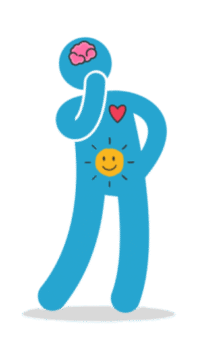Along with Mothers’ Day, how about a National Intuition Day? A day to celebrate our internal, unsung hero.
Whether you call it instincts or gut feel, our intuition is doing a lot of heavy lifting in the background, often so fast and efficient, in fact, that most of the time we don’t know it’s working. It takes so much burden, we mostly don’t even realize there is any challenge at all in the things it is doing.
Your gut knows more than you think it does. Maybe it’s time to pay it some attention!
The irony is that unconsciously, we rely on our gut to dictate so much of our lives, and in many instances it has been what has kept us alive and well, yet when it comes to big decisions, we often work really hard to leave it completely out of the process.
Consider the decision making process when choosing a doctor. We do research into their reviews and maybe had them referred by a friend we trust. Then we meet them and if we are comfortable with what they say, we go for it. Sounds like this is a fairly rational, objective, if not analytical, decision process. But is it? Or is intuition actually driving most of the miles on this journey?
We did some research into their reviews but did we review the reviewers? Do we know their prowess in assessing the quality of a physician? What about our friend? We know they are generally smart and thoughtful. Generally. But do we know they are an astute decision maker when it comes to choosing a doctor? Did we sit with them to review all their decision-making criteria and where they got their data from when they were making their choices? What is their benchmark for what they consider good? And after meeting said doctor, did we take what they said and test it among other physicians to measure the soundness of their recommendations? Did we shadow them through a host of cases to see if we like the variability of their bedside manner among different patients at different times of the day, week, year, to make sure we didn’t happen to have the outlier day when they were being particularly patient and charming? Did we further do the statistics on all their patients’ recoveries? Frankly, as I write this, I am horrified by my sloppy decision making, especially on something so important! If this is how diligent I am at picking a doctor, it’s a marvel I am still alive at all and in one functioning piece…..Or is it?
Should we listen to our intuition all the time?
We absolutely cannot do full blown analysis on every single decision we have to make. We don’t have the time or the resources for that. Consider our tendencies to follow what others do, especially people we know and trust. Whether we admit it or not, we play the odds that the thing, whatever the thing is, that more people are getting/doing/recommending is the better thing. Our discernment in this case, is if overall the group of people we are following are likely to have similar tastes, interests and values to ours. Our intuition plays large in this discernment.
 In critical crisis situations when seconds matter, we have no choice but to rely on the interplay of instinct and intuition. In these circumstances, all we can do is act based on our instinct to survive, informed by previous experiences and whatever information is most immediately accessible in that time frame. We don’t have time to make decisions. We just act. How do we know whether to fight or flight? Well, your mind-body instinct has already decided.
In critical crisis situations when seconds matter, we have no choice but to rely on the interplay of instinct and intuition. In these circumstances, all we can do is act based on our instinct to survive, informed by previous experiences and whatever information is most immediately accessible in that time frame. We don’t have time to make decisions. We just act. How do we know whether to fight or flight? Well, your mind-body instinct has already decided.
Instincts come with birth. Intuition comes with experience. For example, we are all born with an instinct to seek safety. In order to do that, we need to instinctively have biases around what and who is safe for us. Which way the bias goes, that is not hard-wired but rather something that develops over time, starting en-utero. While safe in the womb, we hear our parents’ voices: enter bias #1 and the beginning of intuition. Without the instinct to discern safe from threat, we wouldn’t develop the intuition to know who to cling to.
Have you ever been uncomfortable in a situation where your instinct is to get out of there but rather than exiting, you worry who might think badly of you for leaving? In the animal kingdom, humans are the only ones who have awareness of their instinctive behaviors and can interact, and even override them. We so often relegate all that clever instinct to the corner. We doubt it, argue with it, hush it up and supersede it with our analytical frontal lobe. Clearly this has served us well in many ways or we wouldn’t all be doing it. But haven’t we all also had situations – some more than others – where we have criticized ourselves for overthinking and wishing we had just gone with our gut the first time around?
There is no simple equation of when to rely on intuition and when not to. And even if there were, we have had many years of developing critical thinking and bolstering our internal sceptics and critics to be able to brush intuition aside. Nor should we – critical thinking is also good. The objective then, perhaps, is how to give our intuition more space and a louder voice? How do we not interfere with its prowess and process while still thinking things through?
It starts with paying attention
If this sounds like a worthwhile endeavor, then the first step is to pay it some attention. Rather than ignoring or arguing with your instincts and intuition, pause to really hear what they are telling you. Maybe they don’t have the perfect answer, who knows, but it is one more valid data point to add to the collection. Maybe add it to the trusted friend group when looking for advice; it is one more thing to consider among all the other considerations. Play with it. After making whatever decision you make, check back in to see how right or wrong its messaging may have been. In this way you might learn to trust it, or learn in what areas it is more knowledgeable than others. Don’t worry, it is always there working for you, you just have to make sure you are listening.

